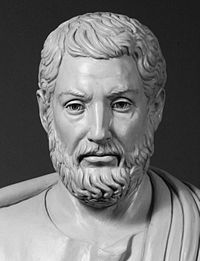Also known as:
Clisthenes, Clisthenis, Cleisthenis, Klisthenis, Κλεισθένης
More People of Greece
More Topic Categories
Related Destinations
Cleisthenes (~-570 - )
 Cleisthenes was a politician of Athens in the 6th century BC. He reformed the Athenian regime after the end of Peisistratus’ tyranny into a more democratic constitution.
Cleisthenes was a politician of Athens in the 6th century BC. He reformed the Athenian regime after the end of Peisistratus’ tyranny into a more democratic constitution.He was probably born around 570 BC. When Peisistratus became the tyrant of Athens, he exiled all the Alcmaeonidae (Cleisthenes’ clan) and the rest of his opponents. After the tyrant’s death in 527 BC, his sons, Ipparchus and Hippias, succeeded him; Cleisthenes returned to Athens and was elected archon eponymous. A few years later, he was again forced to exile, and although he tried hard to free Athens from the tyrants, he failed.
After the second son of Peisistratos, Ipparchus, was murdered in 514 BC by Armodius and Aristogeiton, Hippias became an even harsher ruler. At that point, Cleisthenes asked the Oracle of Delphi to convince the Spartans to help him in his efforts to release Athens from tyranny. As the Oracle owed a favour to Cleisthenes’ clan, she helped. The King of Sparta, Cleomenes I marched to Athens, and along with Cleisthenes’ army, besieged Acropolis in 510 BC, where Hippias was cornered and made him surrender. Hippias was released and many of his followers were sentenced to death.
After the dissolution of tyranny, two parties emerged; the “Coast-dwellers”, under Cleomenes, and the “Plains-dwellers”, mainly aristocrats, under the leadership of Isagoras. Thanks to the support of the aristocrats, Isagoras was elected archon eponymous, and Cleisthenes proposed a series of reformations that greatly appealed to the people. Isagoras, having no other choice left, asked the Spartans for help. The Spartans threatened Athenians with war unless they exiled Cleisthenes, which happened in 508 BC. Nevertheless, when Isagoras attempted to impose an oligarchy, the Athenians revolted, driving Spartans and Isagoras’ followers away; Isagoras barely managed to leave and Cleisthenes was asked to return.
Cleisthenes returned triumphant to Athens in 507 BC, as “protector of the demos”. Before starting the reformation though, an attack by the Spartans was imminent, because they wanted to impose Isagoras on the Athenians. The two Spartan kings disagreed on the matter and in the end, the Spartan attack was cancelled. Meanwhile, though, Athens was attacked by Boeotians and Chalkidans. To retaliate, Athens attacked Chalkida and vanquished its army. The property of the Chalkidan aristocrats was seized and distributed to 4,000 Athenians.
Cleisthenes’ reformation, based on isonomy (that everyone is equal to the laws), lay the foundations of Athenian Democracy. The class system of society was abandoned and Athenians were now categorized based on location, essentially “municipalities”. Each of these clans elected 50 members of the parliament. To protect democracy from potential tyrants, Cleisthenes removed the title of archon eponymous, who was in power for a whole year, and replaced him with a member of the parliament that changed on a daily basis. Another protective measure was ostracism; Athenians could take an “ostrakon”, a piece of a broken vase, and write the name of a potential threat to democracy. If the votes (the ostraka) were over 6,000, then the voted person was exiled for ten years from Athens, without losing any political rights or property.
After implementing the new laws in Athens, Cleisthenes disappeared. No source has been found referring to his death.
See Also:
 Athens Photos
Athens Photos
 Santorini Photos
Santorini Photos
 Crete Photos
Crete Photos
 Meteora Photos
Meteora Photos
 Corfu Photos
Corfu Photos



